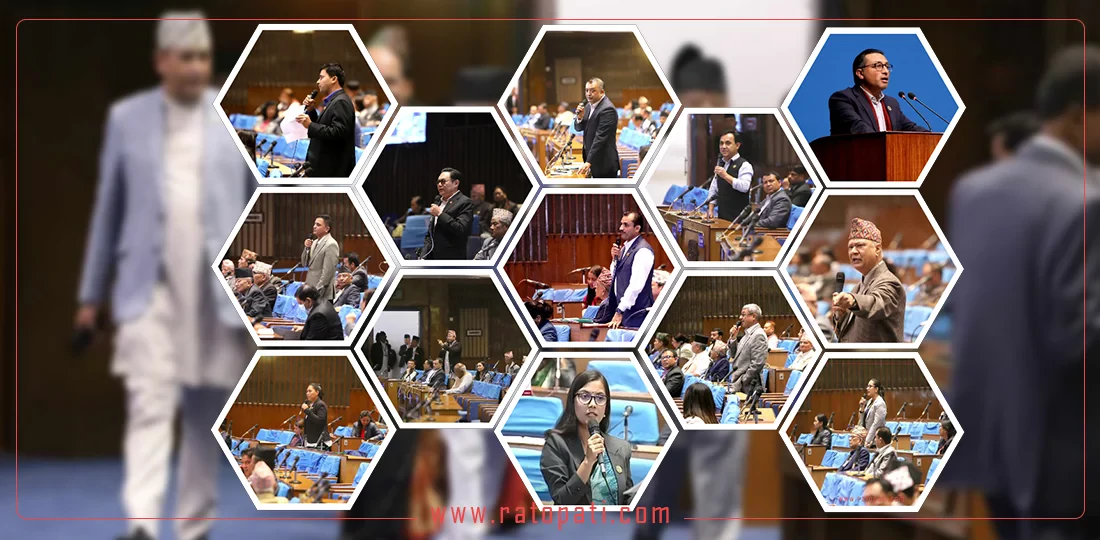Public attention focuses on a few MPs' speeches, media highlights select voices

Kathmandu, November 11 — Debate, heated speeches, and accusations are common occurrences in parliamentary sessions. However, the topics raised in the House are not always focused on the core issues; sometimes, they lack proper foundation or evidence.
Members of Parliament (MPs) have the right to debate, and through debate, the parliamentary system matures. The discussions in the House cover a wide range of topics, not only those related to public welfare and the daily lives of citizens but also national and international issues.
Special, zero, and emergency hours are allocated for MPs to raise such issues. Each of these time slots has different rules. MPs can raise urgent issues that occurred between two sessions within 3 minutes during emergency hour. Zero Hour lasts for one minute and allows MPs to raise issues related to public concerns. During special hour, MPs speak according to their party’s representation after the Speaker allocates time.
In addition to these, MPs can address bills, the budget, and other parliamentary matters while standing on the roster and focusing on substantive issues.
Although all 275 MPs represent various constituencies, not all their speeches attract equal attention. Media outlets tend to highlight the speeches of a few MPs who raise issues in a distinctive way. As one MP informally noted, “Everyone speaks, but only the 2-4 celebrity MPs’ words are meaningful. The rest are ignored by the public, especially female MPs, who hardly get media attention.”
In reality, many MPs raise issues, but not all of them reach the public. Only the speeches of a select few MPs, especially those with a populist tone, tend to gain media traction. However, everything spoken in Parliament is recorded by the parliamentary secretariat.
The role of an MP is to ask questions, hold the government accountable, and initiate debates on public issues in the House. Parliament is the place where people's voices should be heard, and the entire state apparatus should be accountable to it. Therefore, every topic raised in the House is expected to undergo discussion.
Former administrator Jainendra Jivan believes that not all MPs focus on issues that concern the public. The topics they raise are often the primary reason behind this, he said.
People are increasingly aware of how knowledgeable MPs are, how much information they have, and the depth of their discussions in Parliament.
"After elections, MPs focus on issues from their constituencies. A few MPs prepare thoroughly for national and international matters, and those are the speeches that the public values," Jivan remarked.
Especially, the speeches of former Prime Minister KP Sharma Oli in Parliament often attract public attention, even when he is not in office. His speaking style, understanding of issues, and use of idiomatic expressions make his speeches noteworthy. Similarly, former Prime Minister Pushpa Kamal Dahal ‘Prachanda’ also garners attention when addressing the House, especially when targeting KP Sharma Oli, leading to discussions both in the media and political circles.
Debates about their speeches also occur on social media, mainstream, and alternative media platforms.
Other former prime ministers, Madhav Kumar Nepal and Sher Bahadur Deuba, also raise some level of interest when addressing Parliament. Among current MPs, Gagan Kumar Thapa, the General Secretary of the Nepali Congress, is frequently watched and discussed. His stances on various issues, such as the MCC (Millennium Challenge Corporation) and parliamentary committees on cooperative scam, have sparked political debates and public attention.
Similarly, policy debates, and discussions from key leaders like former Chief Whip Ramesh Lekhak and other senior party leaders also draw public interest.
From the Communist Party (CPN-UML), outspoken MPs like Raghuji Pant often speak on media-related topics, challenging the ruling party when in opposition and questioning the opposition when in power. His speeches consistently attract attention.
Key leaders from other political parties, such as Mahesh Bartaula, Yogesh Bhattarai, and Madhav Sapkota, are also known for raising significant issues in Parliament, prompting discussions both inside and outside the House.
Despite the plethora of MPs speaking, only a few stand out, such as Gagan Thapa from the Nepali Congress and Yogesh Bhattarai and Mahesh Bartaula from the CPN-UML, whose words are impactful enough to reach the public.
Rastriya Swatantra Party (RSP) President Rabi Lamichhane and other party leaders like Santosh Pariyar and Dr. Swarnim Wagle also receive significant attention when they speak in the House.
The discussions from parties such as the Rastriya Prajatantra Party (RPP), led by Rajendra Lingden, and the Janamat Party, led by C.K. Raut, also create meaningful debates in the Parliament.
Jivan believes that although new MPs try to bring up issues, many are simply promoting their parties. He argued that MPs should not only be responsible to their party but to the people as a whole.
What topics should MPs raise in Parliament?
Analysts believe that MPs are not focusing enough on issues that speak the language of the people. Instead, many seem to read speeches prepared by others or avoid engaging with national and international topics. Even when the ruling party controls the government, MPs should be holding it accountable. However, this practice is reportedly declining.
MPs must raise issues affecting their constituencies, even if it’s for electoral gain. While some MPs focus on public issues, others are simply engaging in party propaganda.
Jivan criticized the current trend where MPs fail to prepare thoroughly on national and international issues, especially in newer parties where populism is widespread. He noted, “Some MPs don’t speak at all, some speak impulsively, and some only focus on their party’s agenda.”
Jivan emphasized that MPs should be well-informed and should be prepared to contribute meaningfully to national debates. He further questioned why someone would run for office if they were not willing to study and speak responsibly.
In his view, it is more important what kind of issues MPs raise and how they strengthen parliamentary democracy, rather than the mere act of speaking.










Leave Comment